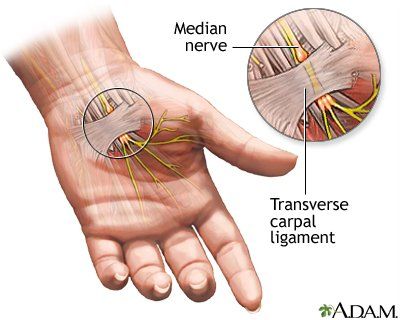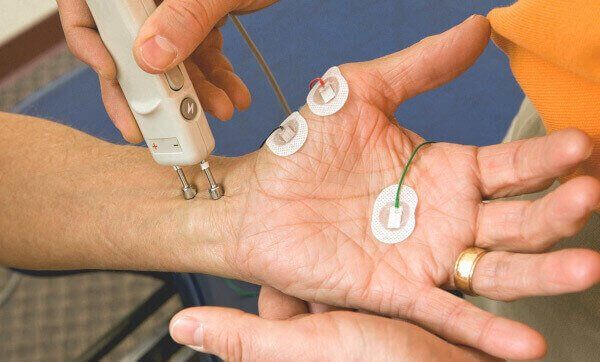How to Avoid a Bad Doctor for Carpal Tunnel Syndrome
From Dr. Z - Carpal tunnel syndrome specialist
Avoiding a Bad Doctor for Carpal Tunnel Syndrome
My new patient Greg recounted his nightmare with his previous doctor for carpal tunnel syndrome. This patient was completely misled, and about to take a risky path to surgery.
I'm posting his experience here because I hear a similar story week after week. Maybe you've had this experience?
To avoid repeating Greg's nightmare experience, ask your doctor the "hard questions". I've listed them at the end of this article. They will be your greatest tool in determining which doctors are bad and which are good.
- FIND OUT: do you have carpal tunnel? No strings attached self-test.
Surgery isn’t a carpal tunnel cure
It was only well into his diagnosis (and 4 doctors later) that my patient Greg learned something new about about carpal tunnel syndrome. His last doctor told him: "There's no such thing as a carpal tunnel cure....not even surgery."
Actually, many doctors know this, but fail to tell their patients. Keep reading and you'll learn why.
What is carpal tunnel syndrome?
If you need a doctor for carpal tunnel syndrome, make sure he or she knows the science. (You can find carpal tunnel doctors in your state here. All are approved by the American Academy of Orthopedic Surgeons.)
A good doctor will explain that carpal tunnel syndrome is a peripheral neuropathy. That means it's an abnormal condition causing injury or damage to a nerve.
In carpal tunnel syndrome, the specific nerve we're talking about is the median nerve. This is one of the major nerves of the hand which is critical in enabling you to feel sensations. These include the feelings of touch, pain, pressure, temperature, etc. from your fingers and palm area.
To get even more specific, carpal tunnel syndrome is a type of peripheral neuropathy called an "entrapment neuropathy". Like the name suggests, it means the median nerve gets trapped and crushed inside the wrist joint.
What traps the median nerve?
Swollen flexor tendons.
When we overwork our hands and fingers, our flexor tendons become stressed and strained. They respond to the strain (like any other tissue) by inflaming and swelling.
Imagine a long balloon that's expanding because more and more water is pumped into it. That expansion represents high pressure inside the swollen tendon.
If the tendon swelling happens in (for instance) the leg or upper arm, it would not cause significant problems. There's plenty of room for the swollen tendon to expand until it eventually heals. Then swelling subsides. In fact, this is called tendonitis (of the leg, arm, etc.)
But when the swelling takes place inside the wrist joint, it's a different problem altogether. The reason is because the median nerve travels alongside the swollen tendons. As they swell, they push the median nerve against the wall of the wrist joint. As a result, the nerve is trapped, crushed, and damaged.
All nerves respond to damage by generating signals of pain or numbness. Therefore, the pain and numbness
signs of carpal tunnel syndrome are effectively your median nerve screaming out,
"Help, I'm being crushed!"
Greg's bad experience with doctors
Greg has carpal tunnel syndrome. Actually, he suspected it for many months. The biggest problem is that numbness and tingling in his right hand would wake him from a dead sleep. Even doing simple things like holding a coffee mug or phone brought on intense numbness.
His insurance first referred Greg to his family doctor or Primary Care Physician (PCP). That doctor then referred Greg to a hand specialist (a hand doctor for carpal tunnel syndrome). Greg told me the specialist only spent 3 minutes holding his arm and hand, tapping, and frowning.
Then the doctor said: “You have carpal tunnel syndrome. Check the desk and we’ll schedule you for surgery.”
The doctor abruptly left the room, leaving Greg astonished. No questions, no bother about Greg's concerns, just: "Have a great day."
"What a jerk!"
He told me when the doctor left, Greg muttered to himself: “What a jerk!”
The doctor's manner was cold and abrupt. Greg had lots of questions to ask. But the specialist was gone before the "surgery news" sunk in.
Greg phoned his family doctor (a warm, older woman) to say what happened. So she referred him to another hand specialist.
Greg summarized the encounter with the new specialist like this. The doctor said: "I believe it's carpal tunnel syndrome. I'll refer you to a neurologist for EMG testing. If the results are positive, we’ll schedule you for carpal tunnel surgery.”
But at least this doctor stood around long enough to answer a few of Greg's questions. The two main ones were:
- What happens if I don't have surgery?
- Are there alternatives to surgery?
The answers to both question was: "If you don't have surgery then your condition will worsen. And there are no alternatives to surgery."
So on the following week Greg went to a
third
carpal tunnel doctor (a neurologist) to have EMG testing. Greg wasn't prepared for the EMG being so painful.
Several needles are inserted into your hand and arm. Then they're electrified. The electric shocks make your hand twitch. And it hurts -- a lot. This normally lasts about 10 minutes, although patients say it seems like hours.
According to Greg, this neurologist was very nice. He said the EMG confirmed Greg had carpal tunnel syndrome. Then the doctor answered all of his questions. They discussed carpal tunnel syndrome, its symptoms, and the pros and cons of hand surgery.
Then this carpal tunnel doctor said something that shocked Greg more than the electrodes. He said: ”Personally, I’d never have the surgery. Carpal tunnel surgery isn’t a cure. Actually, carpal tunnel syndrome has no cure. You’ll always have it.”
Greg said: “So wait. If I get surgery, I’ll still have the numbness?”
The doctor replied: "You might. Or you might not. Either way, you’ll still have carpal tunnel syndrome. And in a year or two or three it might come back again… or it might not. There's no guarantee.”
Greg said: "Hold everything! So if surgery isn’t a cure for carpal tunnel, what is?"
The doctor's answer was: “Nothing”.
That's when Greg came to me for answers and advice.
Why there isn’t a cure for carpal tunnel
It's absolutely true: nothing will cure carpal tunnel syndrome. You can only use surgery or other methods to manage the symptoms. That’s all.
It’s just like what happens with diabetes. There’s no cure for diabetes. But you can use insulin to manage the condition so it doesn’t destroy your life.
It’s the same with carpal tunnel syndrome. Surgery can only manage the symptoms. But so can
exercise,
massage, and even
yoga. But none of these
guarantee
symptoms won’t come back again.
Bottom line: Talk to your own doctor for carpal tunnel syndrome. You'll find there is no cure. But you can manage symptoms quite well. See
this article for more details about carpal tunnel treatments.
And ask the questions below!
Questions to ask your doctor
The very best way to judge if your have a good or bad doctor for carpal tunnel syndrome is to ASK QUESTIONS. A good doctor will make you feel satisfied with his or her willingness to be frank and answer each question so you understand it.
A bad doctor won't do this.
So ask these important questions. A good doctor will take the time to answer them and not be offended whatsoever.
- Are you 100% certain I have carpal tunnel syndrome?
- What treatment plan do you propose?
- Will we try nonsurgical treatments first, before considering surgery?
- What are the out-of-pocket costs of both nonsurgical and surgical options?
- If I have surgery, which technique will you doctor use (endoscopic or open)?
- How long will my recovery take after surgery?
- How much hand therapy and rehab will I need?
- About how many carpal tunnel surgery procedures (either open or endoscopic) have you performed in total?
- What is your success rate using surgery or non-surgical remedies at a patient's two year mark?
- What is your surgical complication rate?
- What is your most common surgical complication?
- Have you been sued for malpractice?
- Will I have to switch my job after surgery?
Conclusion
Any responsible doctor for carpal tunnel syndrome will advise you that if you have symptoms, don't ignore them. Explore every option to relieve the condition. While there's no such thing as a carpal tunnel "cure", there are ways to manage the symptoms so they don't ruin your life. Surgery is certainly one of those options, but not the only one. Actually, surgery is usually the last option patients should use.









